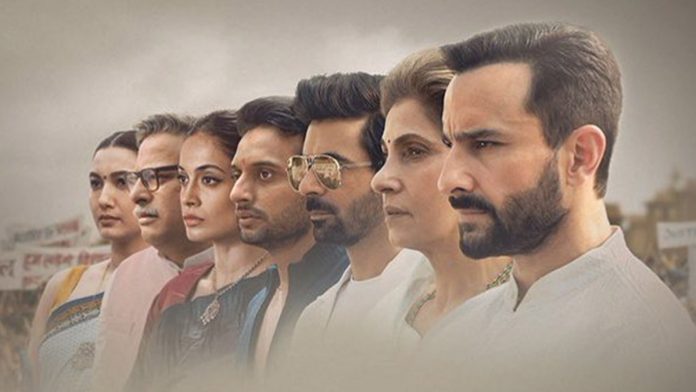Another day, another controversy, another call for a ban. Is this something new? No. However, the frequency at which the toxic conversation of apparent ‘bans’ is taking place has substantially increased over the course of time. Recently, the new target for this was the Saif Ali Khan starrer web-show, Tandav.
‘Tandav’ is an Ali Abbas Zafar creative for the Amazon Prime Video Network. It is a story about political ambitions unfolding, intertwined with personal relationships. Power, hierarchy and the lust to be on top gets the centre stage of the plot. Coalitions, failed relationships, the dark side of Indian politics, and more suitably adjust themselves in the narrative.
The show has been called out by Netizens for hurting religious sentiments. One scene that has particularly caught the attention of many people shows actor Mohd Zeeshan Ayyub playing the role of (a modern-day) Lord Shiva in a college play. The scene was not taken well by many. Another scene from the series that was a topic of discussion was when two characters (played by Anuup Sonii and Sandhya Mridul) talk about caste politics.
The recent call for a ban and also immediate censorship has led to a spiral of discussions, debates, and questions. Let us look into some of those.
Future of OTT platforms?
Gone are the times when OTT platforms were a source of media consumption limited only to a few. With the lockdown and the advent of Hindi content, these platforms have managed to garner themselves with quite a huge support base in India lately. With Netflix India announcing its first Telugu original “Pitta Kathalu”, a four-part anthology movie from filmmakers Tharun Bhascker, BV Nandini Reddy, Nag Ashwin, and Sankalp Reddy, it would not be a huge statement to say that the OTT platforms have managed to get the pulse right. I mean how can we forget about the fandom of “Mirzapur 2”.
With mass acquisition, comes responsibility and accountability. Recently, the move by the Information and Broadcast ministry to bring digital media and online streaming platforms made headlines. With the constant call for bans, netizens expect this to have a quicker turnaround time with stricter policies.
OTT platforms have always been described as a “safe space” for creators and creative freedom. Censorship and creativity are parallel lines, they don’t have an intersection technically. To find a perfect blend of both is what the Indian creators are struggling with. As much as censorship has been emphasised, it is also important to note that too much of it would leave the Indian OTT space with dozens of mediocre vanilla content maybe. This has been a fear of many and to be honest, quite justified.
Religion or Opinion?
Most of the content that gets subjected to this form of outrage revolves around religion and caste. Whether it be, the objectionable temple kissing scene from “The suitable boy” or the religion of the characters from “Laxmii”. There have been constant complaints that only a particular religion or caste gets targeted always. The creative opinions of a few have landed up hurting the religious sentiments of many. The slope of this conversation is slippery. Can opinions be banned? Religious sentiments or freedom of speech? These are arbitrary social discussions that have been in talks for a long time now, with minimum to no objective borders.
Can online ratings or reviews be trusted anymore?
Public outrage has been transcending from Twitter to Public reviewing websites like IMDB. Undoubtedly, this has increased the partiality quotient and affected the reliability level of such sites. IMDB ratings now look like a sham. It is not a new phenomenon where people are paid or instigated to talk ill about a particular art or media piece but what is to be noted is the herd mentality that is picked up from trends and a popular microblogging website, Twitter. Even before their release, shows are blatantly marked with poor ratings and analysis.
This is harmful as the artists and the work gone into making that piece is discredited because there is a difference in opinion and not because of the artwork itself. The scope of work for anyone involved in the project gets limited further and there are at times dire consequences on their career. Risk taking goes off the hook for many talented actors, writers, directors, and more.

